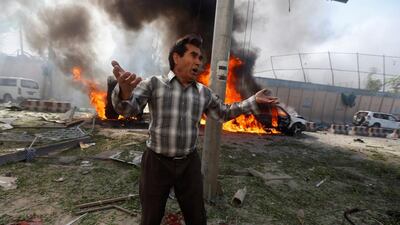KABUL // At least 90 people were killed and hundreds wounded on Wednesday when a massive lorry bomb ripped through Kabul’s diplomatic quarter, bringing carnage to the streets of the Afghan capital just five days into Ramadan.
Bloodied corpses littered the scene and a huge cloud of smoke rose from the highly-fortified area which houses foreign embassies, after the rush-hour attack tore a massive crater in the ground and blew out windows several kilometres away. It was one of the worst attacks Kabul had seen since the drawdown of foreign forces from the country at the end of 2014. The bombing also raised serious questions about the Afghan government’s ability to secure the war-battered nation.
No group has so far claimed the powerful blast, which officials said was caused by 1,500 kilograms of explosives hidden inside a sewage tanker, in what appeared to be a major intelligence failure.
Rescue workers were digging bodies from the rubble hours after the explosion, many of them disfigured and charred, as anguished residents searched for missing relatives. Dozens of mangled and upturned cars choked the roads as wounded survivors and panicked schoolgirls scrambled to safety. Images from the scene showed heavy damage to several embassies located in the area. Germany, Japan and Pakistan said some of their embassy employees and staff were hurt in the explosion. Passers-by stopped and helped the wounded into private cars, others congregated outside the nearby Italian-run Emergency Hospital.
The attack underscores the spiralling insecurity in Afghanistan, where the Nato-backed military, beset by soaring casualties and desertions, is struggling to beat back insurgents.
The explosion took place at the peak of Kabul’s rush hour, when roads are packed with commuters on their way to work. Najib Danish, deputy spokesman for the Interior Ministry, said the bomber detonated his lorry filled with explosives close to a busy intersection in the Wazir Akbar Khan district. The neighbourhood is considered Kabul’s safest area, with foreign embassies protected by dozens of 10-foot-high blast walls and government offices, guarded by police and national security forces. The German Embassy, the Foreign Ministry and the Presidential Palace are all in the area, as are the British, Canadian, Chinese, Turkish and Iranian embassies.
The specific target of the explosion was not immediately known, but Ismail Kawasi, spokesman of the public health ministry, said most of the casualties were civilians, including women and children.
The government’s media centre said 90 people had been killed and 400 injured but health officials warned the toll could increase.
President Ashraf Ghani slammed the attack as a “war crime”, saying, “The terrorists, even in the holy month of Ramadan, the month of goodness, blessing and prayer, are not stopping the killing of our innocent people.”
Afghanistan’s intelligence agency blamed the Taliban-allied Haqqani Network for the attack.
The Taliban -- currently in the middle of their annual “spring offensive” -- denied they were involved and condemned the blast. The insurgent group rarely claims responsibility for attacks that kill large numbers of civilians.
On the other hand, ISIL has claimed responsibility for several recent bombings in Kabul, including a powerful blast targeting a Nato convoy that killed eight people earlier this month.
The sound of the bomb, which went off near Kabul’s busy Zanbaq Square, reverberated across the Afghan capital, with residents comparing it to an earthquake.
The US state department said nine Afghan guards at the US embassy were among those killed, with one more unaccounted for. Eleven contractors were among the injured.
The BBC said its Afghan driver, Mohammed Nazi, was killed and four of their journalists wounded. Local TV channel Tolo TV also tweeted that a staff member, Aziz Navin, was killed.
German Foreign Minister Sigmar Gabriel said the “despicable” attack killed an Afghan guard from the German embassy, and injured other employees.
Germany has had troops in Afghanistan for 15 years, primarily concentrated in the north in and around Mazar-e-Sharif., and are one of the biggest contributors to the Nato-led Resolute Support mission with around 980 soldiers on the ground to support and train Afghan security forces.
France, India, Turkey, Japan, the United Arab Emirates and Bulgaria similarly reported damage to their embassies, including shattered windows, as the blast drew an avalanche of international condemnation.
The White House issued a scathing statement condemning the “atrocious” attack.
“That this attack would occur during the holy month of Ramadan underscores the senseless and barbaric nature of this attack,” a White House spokesman said.
Amnesty International said the bombing shows that the conflict in Afghanistan is “dangerously widening in a way that should alarm the international community”.
Germany was forced to postpone a scheduled deportation flight of rejected Afghan asylum seekers in the wake of the attack.
Pentagon chief James Mattis has warned of “another tough year” for both foreign troops and local forces in Afghanistan.
* Associated Press and Agence France-Presse

